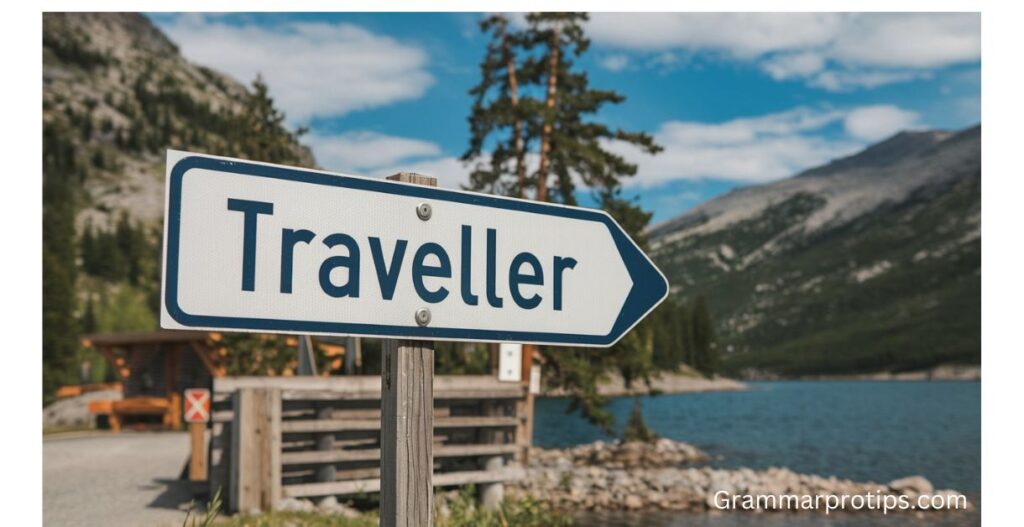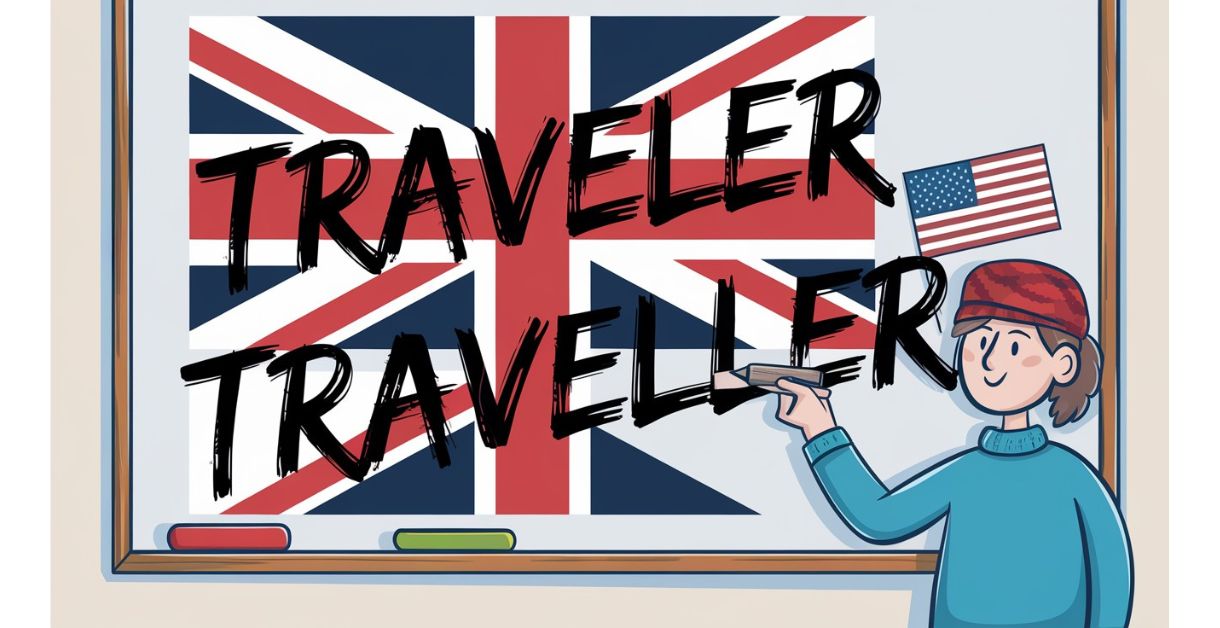The English language is full of quirks, particularly when it comes to spelling. If you’ve ever wondered whether to use traveler or traveller, you’re not alone.
This simple question can be a point of confusion for many, especially those who are new to the intricacies of British and American English.
Traveler or Traveller: Understanding the Difference
Before we dive deep, let’s address the core question: Which spelling is right? The answer depends on where you’re writing and who your audience is. Traveler is the preferred spelling in American English, while traveller is typically used in British English.
Here’s a simple breakdown:
- Traveler is the standard in American English.
- Traveller is the standard in British English.
Despite the difference, both versions are considered correct, but choosing the right one depends on the regional spelling conventions you want to follow.
Traveler vs Traveller: Historical Roots

The distinction between traveler and traveller dates back to Noah Webster, the man behind many of the spelling reforms in American English. In his dictionary, Webster advocated for simpler, more phonetic spellings. For example, he dropped the extra “l” in words like “traveller,” “theatre,” and “colour.” Thus, traveler became the preferred form in America, while British English maintained the traditional spelling with double “l.”
Webster’s reforms aimed to make spelling more intuitive and accessible. The American spelling system, which favored simplified forms, gained traction, while British English continued to use more traditional spellings that retain the influence of older forms of the language.
Which One Should You Use?
When choosing between traveler or traveller, consider the context. If you’re writing for an American audience, stick with traveler. If your writing is aimed at a British audience, traveller is the correct choice.
But there’s more to it than just geographical conventions. Here are a few scenarios where these spellings matter:
Example 1: A Travel Blog Post
Imagine you’re writing a travel blog targeted at American readers. You might write:
“As a traveler, I’ve explored cities all over the world. Each journey has brought me closer to understanding different cultures.”
In this case, traveler is the correct spelling because the audience is American.
However, if you’re writing for a UK-based travel blog, you’d write:
“Every traveller has their own unique story. Whether you’re visiting the bustling streets of London or the peaceful hills of Scotland, the experience is unforgettable.”
This version uses traveller, adhering to the conventions of British English.
Example 2: Email Correspondence
Let’s say you’re emailing a friend about your next trip. You might write:
Email to an American Friend:
“Hey Emily, I just booked my flight! I can’t wait to be a traveler again. This time, I’m heading to New York City!”
Email to a British Friend:
“Hi Emily, I’ve just secured my flight. Can’t wait to be a traveller again. This time, I’m off to New York City!”
Notice how both emails convey the same message, but the spelling changes based on the location of the recipient.
Traveler Spelling in British English and American English
While traveller (with double “l”) is common in British English, it’s important to remember that this isn’t the case in American English. The differences between the two varieties of English extend beyond just spelling; pronunciation, grammar, and vocabulary all vary. For example, while British speakers might say “traveller” with a distinct emphasis on the “l,” American speakers might pronounce “traveler” more fluidly.
Example: Regional Spelling Preferences
- British English: “The traveller gazed out the train window, excited about his next adventure.”
- American English: “The traveler was thrilled to visit the famous landmarks of Paris.”
The Influence of Noah Webster’s Reforms
Webster’s influence goes beyond just traveler vs traveller. He helped shape many spelling differences that persist today. Words like “honour” (British) vs. “honor” (American) or “centre” (British) vs. “center” (American) all stem from his drive to simplify English spelling.
For instance, he also introduced the traveler spelling in American English without the extra “l” because he believed it made more sense from a phonetic standpoint. His idea was that language should reflect how words are pronounced.
How to Pronounce Traveller

Whether you use the British or American spelling, it’s essential to know how to pronounce traveller (or traveler). Both versions are pronounced similarly, with the emphasis placed on the first syllable, “trav.” Here’s how you pronounce them:
- Traveller: /ˈtrævələ(r)/ – Emphasizing the first part, “trav,” with a soft ending.
- Traveler: /ˈtrævələr/ – A slight difference in the ending, but the overall pronunciation remains quite close.
The difference in pronunciation mainly arises from regional accents, rather than any distinct variation in the word itself.
Understanding Regional Spelling Preferences
When writing, it’s important to choose the correct spelling based on your global audience. If you’re unsure of whether to use traveller or traveler, think about where the reader is from. If you’re writing for an international audience, it’s often best to choose one version and be consistent throughout your work. This avoids confusion and ensures that your writing adheres to the correct language conventions.
Other Examples of Spelling Differences: British vs American English
The distinction between traveller vs traveler is just one example of how British and American English differ. Let’s take a look at a few more:
| British English | American English |
|---|---|
| Colour | Color |
| Favourite | Favorite |
| Theatre | Theater |
| Centre | Center |
| Honour | Honor |
| Realise | Realize |
As you can see, many of these spelling differences come from the same historical sources. In many cases, American English tends to favor simpler, more phonetic spellings, while British English sticks to more traditional forms.
Consistency in Writing
One of the most important aspects of writing, whether it’s a blog post or a formal email, is consistency. When you choose one spelling over the other, stick with it throughout your work. If you begin using traveler, don’t switch to traveller midway through your article, and vice versa. This consistency in writing makes your content more polished and professional.
Example: Travel Insurance Email
Imagine you’re discussing travellers insurance in an email to a client:
Email to a British Client:
“Dear Mr. Harris,
We recommend that all travellers secure insurance before embarking on their trip. It’s important to ensure that you’re covered in case of unexpected events during your travels.”
Email to an American Client:
“Dear Mr. Harris,
We strongly suggest that all travelers secure insurance before their trip. This helps protect you from unforeseen circumstances during your journey.”
Again, the difference here is purely regional and reflects the spelling conventions of British English and American English.
A Note on Genshin Impact and Other Games

You might even encounter the traveller or traveler spelling in popular games like Genshin Impact. The game uses the term “The Traveler” to refer to a central character, and they’ve adopted the American spelling for consistency. Even in the world of video games, regional spelling preferences can make an appearance, especially when the game’s target audience spans across multiple countries.
Example: Genshin Impact
In a Genshin Impact forum or fan site, you might see:
“The Traveler in Genshin Impact is an incredibly versatile character, capable of switching elements based on the regions they explore.”
Conclusion
The debate between traveler or traveller comes down to regional spelling preferences. Both versions are correct, but which one you use should depend on your audience. Whether you’re writing a travel blog, crafting an email to a friend, or working on a formal report, make sure to follow the spelling conventions that align with the region you’re targeting.
When in doubt, choose consistency. If you’re writing for an international audience, pick one version and stick with it throughout your content. Most importantly, remember that language evolves, and it’s not just about spelling – it’s about communication. So, whether you’re a traveller or a traveler, as long as you’re getting your message across, you’re doing just fine!

“Smith is the dedicated admin of [grammarprotips.com], a platform focused on enhancing grammar skills. With a passion for language and education, Smith strives to make grammar accessible and enjoyable for learners of all levels. Committed to delivering high-quality content, Smith continually explores innovative ways to help users master the complexities of grammar.”

